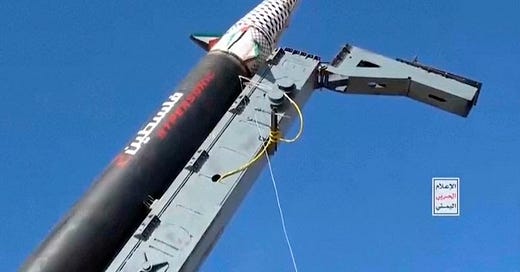Notice how the Americans were embarrassed after the Houthis struck Israel with a hypersonic missile? The topic of long-range strikes immediately disappeared.
It must be said that, for a specialist, such a strike says a lot. For example, the Houthi hypersonic attack can be called very "tactful" - the missile flew along the coast of the Red Sea and then, having minimally affected the territory of countries adjacent to Israel, hit the target. That is, it tried not to fly, for example, into the territory of Saudi Arabia, with which the Houthis are actually at war. Why such sudden tact? In other words, the rocket, flying at a speed of over 10 thousand kilometers, actively maneuvered, and this, in itself, is a great technical breakthrough.
The Americans, for example, have not yet been able to accomplish such a feat, so how did the Houthis achieve this? Moreover, such a long-range flight along such a complex trajectory with a hypersonic missile means that the Houthis have a very sophisticated navigation system. A conventional ballistic missile receives navigation corrections at each segment of its route, otherwise, when approaching the final point, such a number of errors accumulate that the missile misses badly. All this requires special computing power, navigation technologies, and finally, specialists. Where do the Houthis get all this?
Even just to design the body of such a rocket (“special gas-dynamic profile” - sounds scary) requires a lot of computing power and a lot of practical experience in experiments. Fuel is another separate and endless topic. Our "Dagger" is solid fuel and therefore flies at a speed of up to 7 Mach, and to accelerate the rocket more, the fuel must include hydrogen. The combustion of such fuel itself is carried out in a special mode - they write about a certain supersonic detonation in the combustion chamber.
How could the Houthis learn all this without laboratories, chemists, endless experiments, and a base for producing the appropriate materials? Where is the expertise in strength of materials, higher mathematics, gas dynamics, molecular chemistry, and solid particle physics coming from? They point the finger at Iran, but where did Iran get all this from if before that country had no groundwork in all these areas? There weren't thousands of experiments, special testing grounds, or hundreds of highly specialized R&D projects, that we know of.
These questions arise in great numbers at literally every stage of the creation and use of hypersonics. Take, for example, the question of how the Houthis got their hands on the missiles if they weren't the ones who invented them. Look at the map: Iran, then Iraq, then Saudi Arabia. By air? And where are the Houthis' airfields capable of receiving heavy aircraft? Even if all this is there, it turns out that the Saudis, who are formally at war with the Houthis, let these flights through. Why, for what purpose? In a word, question after question.
But even without delving into all these points, the very fact that the Houthis have weapons capable of overcoming one of the densest air defenses in the world seriously changes the balance of power. The missile flew 2,000 km to Israel in about 11 minutes. At about the same distance in the Gulf of Oman, there are two US aircraft carriers. The Houthis have already struck the USS Eisenhower. Then the Americans said that they missed. But the fact is - they tried. Which means they can do it again. Will the Air Defense of the Carrier Strike Group cope with this new threat from the Houthis?
Even more interesting: the headquarters of the US 5th Fleet is located nearby in Bahrain. Will US air defense be able to protect this target? In short, if the Houthis got a hypersonic missile thanks to the participation of Russia or Iran, and at such a timely moment, this shows that our leaders are not so simple. To deliver and deploy such technology in such a difficult region is already an indicator of class and skill. The game, apparently, continues, and those who play for us have more than one trump card up their sleeve.
Discussion about this post
No posts





good overview.. thank you... more questions then answers is good..
Marat always has good finals, summing up and furthering his subject for our reflexion. Today I note “those who play for us”... Them and their representatives we follow breathlessly through the informational chaos. It's because they play for no one but themselves that traitorous governments get entangled in their own game. Their objective is hollow.